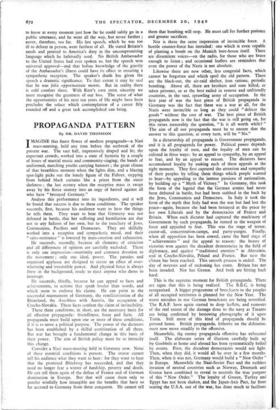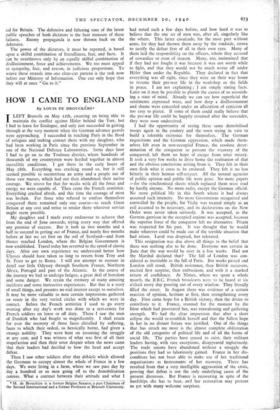PROPAGANDA PATTERN
By DR. DAVID THOMSON
IMAGINE that finest flower of modern propaganda—a Nazi mass-meeting, held any time before the outbreak of the present war. The vast hall, impressively draped and lit; the expectant crowds, worked into a state of hysteria by a couple of hours of martial music and community-singing; the bands of uniformed, marching youths carrying banners ; the great climax of that breathless moment when the lights dim, and a blazing spot-light picks out the lonely figure of the Fiihrer, stepping from behind black curtains like a priest from the outer darkness ; the last ecstasy when the receptive mass is swept away by his fierce oratory into an orgy of hatred against all who have " betrayed Germany."
Analyse this performance into its ingredients, and it will be found that success is due to three conditions. The speaker succeeds, first, because his audience want to hear the things he tells them. They want to hear that Germany was not defeated in battle, that her suffering and humiliation are due not to any failures of her own, but to the treachery of Jews, Communists, Pacifists and Democrats. They are skilfully worked into a receptive and sympathetic mood, and their " sales-resistance " is lowered by mass-emotion and exhaustion.
He succeeds, secondly, because all elements of criticism and all differences of opinion are carefully excluded. There is only one impression—unanimity and common devotion to the movement ; only one ideal, power. The parades and organised applause are designed to create an effect of over- whelming and irresistible power. And physical force is always there in the background, ready to eject anyone who dares to interrupt.
He succeeds, thirdly, because he can appeal to facts and achievements, to actions that speak louder than words, and which seem to endorse his claims. He can point to the successful rearmament of Germany, the remilitarisation of the Rhineland, the Anschluss with Austria, the occupation of Czecho-Slovakia. These facts confirm the claim of invincibility.
These three conditions, in short, are the necessary basis for all effective propaganda: friendliness, force and facts. All propaganda must build upon one or more of these conditions, if it is to serve a political purpose. The power of the dictators has been established by a skilful combination of all three. But war has brought a fundamental change in this basis of their power. The aim of British policy must be to intensify this change.
Consider a Nazi mass-meeting held in Germany now. None of these essential conditions is present. The orator cannot tell his audience what they want to hear: for they want to hear that the promised Blitzkrieg has succeeded, and that they need no longer fear a winter of hardship, poverty and death. He can tell them again of the defeat of France and of German domination in Europe. But that will cause them only to ponder wistfully how intangible are the benefits that have so far accrued to Germany from these conquests. He cannot tell them that bombing will stop. He must call for further patience and greater sacrifices.
Nor is there the same impression of invincible force. A hostile counter-force has intruded: one which is even capable of planting a bomb on the Munich beer-house itself. There are dissentient voices—on the radio, for those who are brave enough to listen ; and occasional leaflets are reminders that even the power of the Nazis is not absolute.
Likewise there are now other, less congenial facts, which cannot be forgotten and which spoil the old pattern. There are the black-out, the air-raid shelter, iron rations, periodic bombing. Above all, there are brothers and sons killed, or taken prisoner, or at the best exiled in remote and unfriendly countries, in the vast, sprawling army of occupation. In the first year of war the best piece of British propaganda in Germany was the fact that there was a war at all, for the Nazis were invincible so long as they could " deliver the goods " without the cost of war. The best piece of British propaganda now is the fact that the war is still going on, for this raises inexorably the question, " Is it all worth while? " The aim of all our propaganda must be to ensure that the answer to this question, at every turn, will be " No."
In a dictatorship all propaganda is Government propaganda, and it is all propaganda for power. Political power depends upon the loyalty of men, and the loyalty of men can be enlisted in three ways: by an appeal to sympathy, by an appeal to fear, and by an appeal to reason. The dictators have accumulated loyalty by making each of these appeals at the right moment. They first captured the attention and sympathy of their peoples by telling them things which people wanted to hear—by appealing to the intense passions of nationalism, by building up a " Myth of Victory." In Germany, this took the form of the legend that the German armies had never been defeated in battle, but had been stabbed in the back by the Jews, Communists and Democrats. In Italy it took the form of the myth that Italy had won the war but had lost the peace—again, because she had been betrayed at the peace by her own Liberals and by the democracies of France and Britain. When each dictator had captured the machinery of Government by such propaganda, he turned to the weapon of force and appealed to fear. This was the stage of terror, castor-oil, concentration-camps, and party-purges. Finally, when all opposition has been cowed, came the final stage of " achievements " and the appeal to reason: the boasts of victories won against the decadent democracies in the field of diplomacy, and against " traditional enemies " in Abyssinia, and in Czecho-Slovakia, Poland and France. But now the climax has been reached. This smooth process is ended. The day of reverses and of reckoning has come. Britain has not been invaded. Nor has Greece. And both are hitting back hard.
This is the supreme moment for British propaganda. There are signs that this is being realised. The B.B.C. is being reorganised. A bigger programme of broadcasts to the peoples of all occupied territories is planned for the New Year. The worst mistakes in our German broadcasts are being remedied. The R.A.F. have again started to drop leaflets, and rumours of the real extent of the damage done to the navy at Taranto are being confirmed by bestowing photographs of it upon Turin. Still more of this kind of propaganda should be pressed home. British propaganda, hitherto on the defensive. must now move steadily to the offensive.
Meanwhile, the enemy propaganda offensive has exhausted itself. The elaborate series of illusions carefully built up by Goebbels at home and abroad has been systematically belied by events. First, the decadent democracies would not fight. Then, when they did, it would all be over in a few months. Then, when it was not, Germany would build a " New Order " in Europe. Meanwhile the Nazi-Soviet Pact and the ruthless invasion of neutral countries such as Norway, Denmark and Greece have combined to reveal to neutrals the true purpose of this " New Order." The loyalty of Greece, Turkey and Egypt has not been shaken, and the Japan-Axis Pact, far from scaring the U.S.A. out of the war, has done much to facilitate aid for Britain. The defensive and faltering tone of the latest public speeches of both dictators is the best measure of these failures. Enemy propaganda is now thrown back on the defensive.
The power of the dictators, it must be repeated, is based upon a skilful combination of friendliness, fear, and facts. It can be overthrown only by an equally skilful combination of disillusionment, force and achievements. We too must appeal to sympathy, fear, and reason, in judicious proportions. To weave these strands into one clear-cut pattern is the task now before our Ministry of Information. One can only hope that they will at once " Go to it."



























 Previous page
Previous page